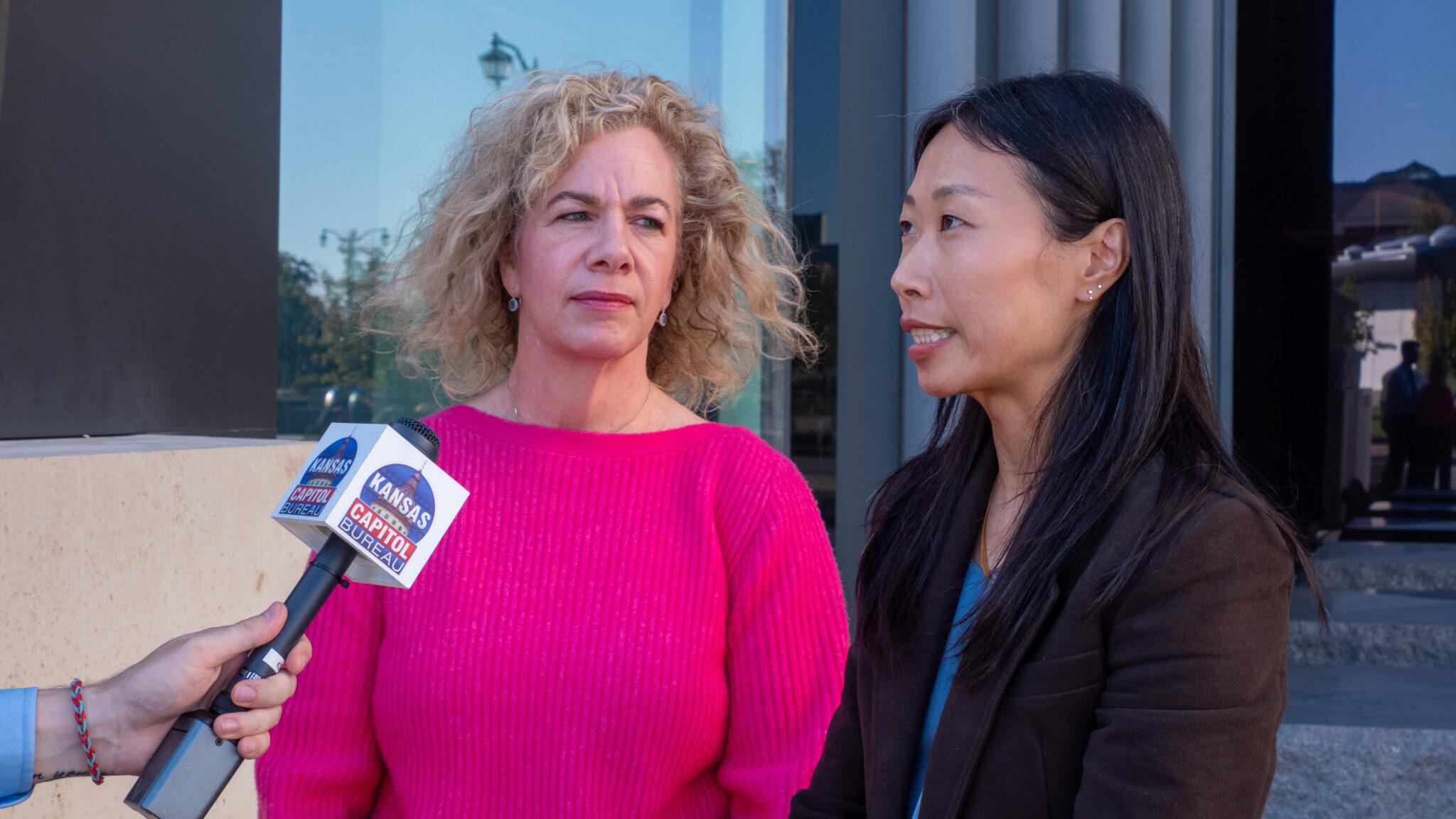By Anna Kaminski
Kansas Reflector
OLATHE — A trial that could determine whether state-imposed abortion restrictions can remain in Kansas began Friday with testimony from the abortion providers behind the challenge.
Traci Lynn Nauser, an OB-GYN who owns a clinic in Overland Park, told a small but full courtroom about the burdens of state legislation requiring abortion providers like herself to comply with a litany of anti-abortion rules.
The bench trial in Johnson County District Court examines the Kansas Women’s Right to Know Act, which was passed in 1997 and modified several times by the Kansas Legislature over the years.
Nauser said many of the state’s requirements broke down trust from the beginning of her patient interactions. Iman Alsaden, the chief medical officer for Comprehensive Health of Planned Parenthood Great Plains, testified that the state’s restrictions undermined informed consent and relationships with patients.
The trial’s outcome could impact how abortion providers and lawmakers do business. Attorneys for the state dissected Alsaden’s and Nauser’s expertise on medication abortions, abortion reversals and the experiences of patients.
The Center for Reproductive Rights, a legal advocacy organization, brought the lawsuit in 2023 on behalf of Nauser, her practice and Planned Parenthood, challenging the 1997 law and its amendments. The lawsuit came nearly a year after Kansas voters in 2022 rejected an attempt to eliminate the constitutional right to terminate a pregnancy, which the Kansas Supreme Court established in a 2019 ruling on a case brought by Nauser and Herbert Hodes, Nauser’s father.
That vote made Kansas one of the few states in the region to cement abortion rights, but Republican lawmakers found ways through additions to the Women’s Right to Know Act in 2024 to couch those rights with new mandates for abortion providers.
Among them, lawmakers created a requirement that physicians must tell patients at least five times that medication abortions can be reversed, a procedure Nauser has never performed, calling it “experimental,” unproven and potentially dangerous for patients. It also created the “reason mandate,” which requires physicians to ask patients to disclose the most important factor in deciding to obtain an abortion. Some reasons given ask whether the patient has too many children already or if the patient cannot provide for the child.
The center asked a judge in 2024 to add the new laws to its lawsuit, which was allowed, and in October 2023, Judge K. Christopher Jayaram granted a temporary injunction, halting the implementation of those laws
“We are now able to get patients the care they need when they need it,” Alsaden said.
The lawsuit also challenges requirements that providers disclose state-sanctioned anti-abortion language, including the false claims that abortion poses a risk to future pregnancies and increases the risk of breast cancer. Physicians have to present the information in a specific typeface, font size and color. And patients have to wait 30 minutes after meeting with their provider before they can receive abortion care.
Nauser said during testimony Friday that the state’s requirements were “the antithesis of informed consent.” She said the state’s materials contained misinformation, burdened the patient-physician relationship, required patients to jump through hoops and necessitated what Nauser described as long, confusing conversations.
She said she is unaware of any patient of hers who did not get an abortion because of the state’s mandates.
Alice Wang, attorney for the Center for Reproductive Rights, asked Nauser if she had ever come across a patient who regretted getting an abortion.
Nauser said patients can have mixed feelings, including grief or sadness, but not regret. Wang asked Nauser to give an example.
Nauser began to cry.
She was one of those patients, she said.
Roughly 25 years ago, Nauser said, she became pregnant with quadruplets after struggling with infertility. Nauser and her husband decided to abort two of the fetuses with a procedure in Detroit to increase the likelihood of survival for the remaining two. Around 20 weeks, pregnancy complications arose. One of the remaining fetuses was stillborn, and the other was born alive but didn’t survive. She said she basically had four abortions in one pregnancy.
The lead attorney for the state, Lincoln Wilson, of the conservative Christian legal advocacy group Alliance Defending Freedom, pointed out while cross-examining Nauser that around one-third of patients don’t schedule a follow-up appointment following an abortion, and of the two-thirds who do, they frequently don’t show up, according to previously disclosed information from Nauser. He questioned whether it was possible to know for certain if patients experienced regret.
Nauser inherited her medical practice and clinic, Center for Women’s Health, from her father, who is a retired OB-GYN and abortion provider. Her first memory was her father performing surgery on a teddy bear, she said. Later, she said she remembered pickets outside her family home on Sundays, which was how she learned her father performed abortions.
During Wang’s examination of Nauser, Wilson repeatedly interrupted with objections, which Jayaram had little patience for.
Teresa Woody, an attorney on the case in her capacity as a private practitioner rather than in her role as litigation director for the advocacy organization Kansas Appleseed, said in an interview with Kansas Reflector that she believes the plaintiffs have very sound grounds in the trial. She said the temporary injunction is a good indicator in favor their arguments.
“None of us can read the future, but based on those things and the case law that is there now, we feel confident that these requirements and restrictions are unconstitutional,” Woody said.
Kansas solicitor general Anthony Powell, a former state representative and appeals court judge, is overseeing the team of attorneys for the state.
The trial is scheduled to continue with witness examination Monday and Tuesday, which will be followed by a nearly monthlong pause until it picks up again Oct. 14.
This report was originally published by the Kansas Reflector. To read more stories like this, visit https://kansasreflector.com.



